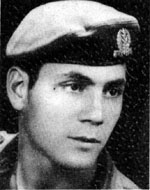Doctori, Moshe (“Moshi”)
Son of Shalom and Shderot. He was born on June 4, 1948 in Baghdad, the capital of Iraq. In 1951 the family immigrated to Israel. Moshe attended the Ma’ayanot Elementary School and the Gilboa High School in Beit Shean. Moshe was prominent in his achievements, modest in his actions and loved by his friends. He was a member of the Hanoar Haoved Vehalomed movement and was a counselor in it. Prior to joining the IDF, he joined the “unfortunate” nucleus in Kfar Ruppin in the framework of the Shalat. In September 1965 he was drafted into the IDF and served in the Nahal paramilitary brigade. Participated in the Six-Day War in the Gaza Strip and fought in the Rafah area. He took part in additional military operations, some beyond enemy lines, such as the explosion of the water wells in Qalqiliya, and in the Karameh operation, where he was also wounded. On the eve of Passover, Moshe came to celebrate the Passover seder with his parents, and he had to finish his vacation only two days later, but the day after Passover he stopped his holiday and packed his belongings and returned to the base to fill the place of his friend on duty. As soon as he returned to the base, he joined the hunt for terrorists in the Jordan Valley. On his return from this activity, he wrote letters to his family and girlfriend (which he did not get to send). That evening, on the 15th of Nissan 5748 (April 14, 1968), he was again called upon to act again against terrorists who had been found hiding in the Jiftlik caves. Moshe commanded this action and when he gave the order of the assault he was hit by the terrorists’ fire and killed. He was laid to rest in the military cemetery in Kiryat Shaul. Survived by his parents and nine brothers and sisters. The memory of Moshe is commemorated at Yad Labanim in Petach Tikvah, where his parents lived, in the Jordan Valley Monument, engraved among the fallen, and by his friends a youth club working and studying in his name in Beit She’an and next to it a monument designed as parachuting wings that shield his picture. David, who was wounded in the Yom Kippur War and was buried next to his younger brother Moshe in the Kiryat Shaul military cemetery, says: “The lovers and the pleasant ones in their lives and in their deaths did not part.” (This page is part of the Yizkor memorial project, the security)
